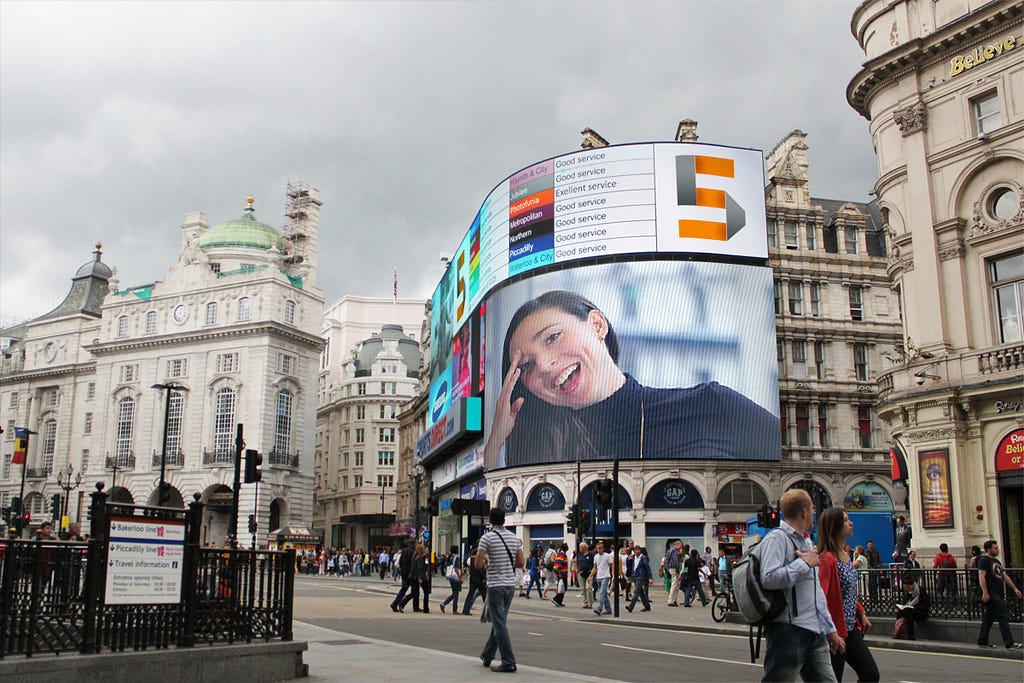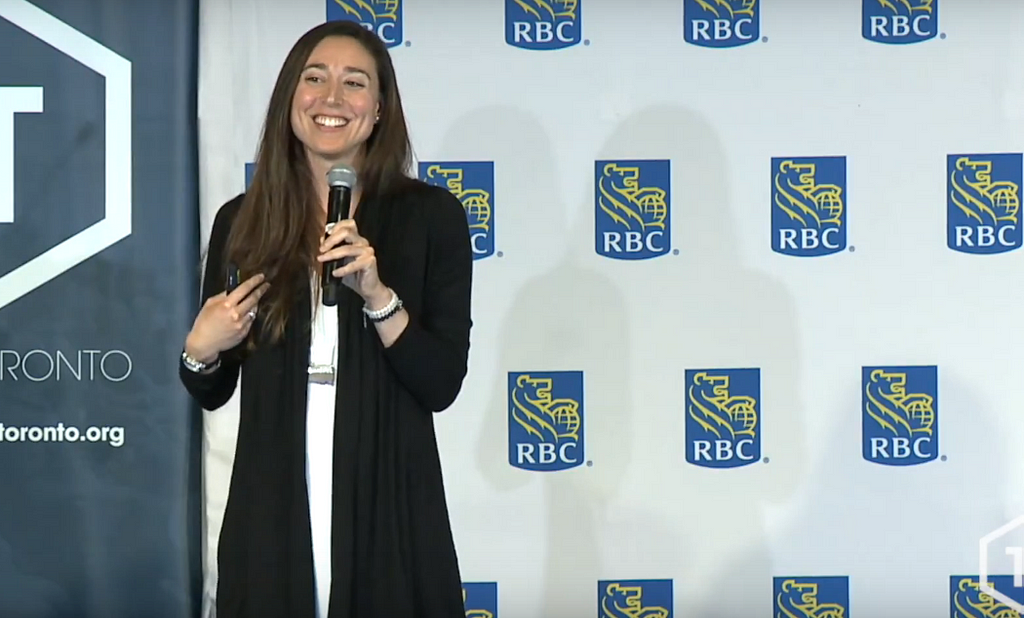“Mindfulness slows us down and reminds us of what we’re doing — and why.” with Jessica Weisz and Fotis Georgiadis

Mindfulness is what keeps me — and our business as a whole — focused and thriving. There is so much going on in our lives today, from binging on our phones to major news stories grabbing our attention, to the ever-increasing pressures and challenges of growing a business. All of this can lead to major stress and unproductivity. Mindfulness slows us down and reminds us of what we’re doing — and why. That allows us to focus on the “how.” In other words, I find that when we slow down, we can go faster.
As a part of my series about leaders who integrate mindfulness and spiritual practices into their work culture, I had the pleasure of interviewing Jessica Weisz, Chief Operating Officer at SoapBox, a rapidly growing Toronto-based tech startup used by managers at over 8,000 scaling companies (like Intercom, Foodora and Wayfair) to have better one-on-ones, team meetings and company-wide discussions. In her former life, Jessica was a consultant at McKinsey & Company and also led strategic initiatives for senior executives at BMO Financial Group. She’s a regularly-requested speaker at top global tech events such as SaaStock, SaaS North and TechTO.
Thank you so much for doing this with us! Can you please share your “backstory” with us?
I come from the world of “Big Corporate.” In the corporate world, I learned a lot and the individual people were wonderful, but the environment made me anxious. There was a huge focus on perfection (or risk getting called out harshly), and it was an overly formal atmosphere — more robotic than emotional. In other words, there wasn’t really room for how I was feeling, and what made me feel energized, or deenergized, for that matter.
Also, I couldn’t build there. I wanted to create things, bring them to life. That kind of thing can’t really happen in a large organization — at least not at the speed or with the creative license I was looking for. So, I left my 40,000-employee company to work with four others in a startup. I like to joke that when I made the jump to the startup world, I went from black blazers to brightly-colored leggings ?.
What role did mindfulness or spiritual practice play in your life growing up? Do you have a funny or touching story about that?
Honestly, it was never really a conscious thing growing up. But looking back, one anecdote my mom always shares comes to mind. It gives me insight into how I’m able to focus, be present and take in my surroundings: When I was young, I would quietly sit in the backseat of the car with my mom and brother up front. My mom would call back to ask if I was listening to her, and I’d promptly say yes. It seemed like I was off in another world, but really, I was just taking everything in.
Even today, I find myself doing that. I like pulling back a bit, and just being in the moment, taking it all in. Maybe that was the first step in me learning how to be mindful — how to take in a beautiful moment or be attentive to others I am engaging with.
How do your mindfulness or spiritual practices affect your business and personal life today?
Mindfulness is what keeps me — and our business as a whole — focused and thriving. There is so much going on in our lives today, from binging on our phones to major news stories grabbing our attention, to the ever-increasing pressures and challenges of growing a business. All of this can lead to major stress and unproductivity.
Mindfulness slows us down and reminds us of what we’re doing — and why. That allows us to focus on the “how.” In other words, I find that when we slow down, we can go faster.
Do you find that you are more successful or less successful because of your integration of spiritual and mindful practices? Can you share an example or story about that with us?
Definitely more successful. Mindfulness allows me to note and acknowledge my success.
Success is such a personal and subjective construct. There isn’t a definite marker of “you are successful.” Success comes when I achieve something that I personally feel is important. I really believe we are all successful in our own right.
When I’m mindful, when I’m present and attentive to what I’m doing, how I’m feeling and where I’m at, I’m able to notice more. The things I’m doing, the peaks I’ve climbed, the awesomeness I am experiencing. That makes me feel more successful, and therefore I am more successful.

What would you say is the foundational principle for one to “lead a good life”? Can you share a story that illustrates that?
For me, it’s staying focused on today. Slowing down is so crucial — I call it “koala mode.”
This comes from when I went to Australia to meet with some SoapBox customers, and I went to a koala sanctuary. Watching them, I got a sense of how calm life could be. They seemed to just focus on what they were eating, what they were about to eat, and sleeping.
I shared some videos of the sanctuary with our CEO Brennan McEachran, and it became an email sign-off between the two of us to say “Koala.” That was shorthand for, “So long as today is great and tomorrow seems like it will be too, then I’m good.”
This has come up a lot at SoapBox, where we’re building a company from the ground up, and there’s no certainty of our futures. There’s potential for stress around every corner. But focusing on today and tomorrow reminds us that we’re doing what we’re doing because we enjoy the experience. And it personally keeps me sane because I’m more content staying in the moment.

Can you share a story about one of the most impactful moments in your spiritual/mindful life?
One of the most impactful moments was when I realized that our efforts to create a supportive, open, mindful culture at SoapBox had taken shape.
Last year, during a hackathon at SoapBox, an engineer bravely stood up in front of the entire company and talked about how he was struggling with anxiety and the aftermath of a serious panic attack. He asked others to join him in designing resources and activities to create a mentally-healthy workplace.
He was joined by a group of employees that helped to build a dedicated committee at SoapBox, called BrainBoxers, with the mandate of bringing mindfulness and mental health to the forefront of our day-to-day.
The fact that he felt comfortable being vulnerable in front of his peers showed me that the efforts we’d all put in at SoapBox over the years was taking hold. Because a mindful culture has to live outside of select leaders. This committee being initiated not by myself or Brennan demonstrated that mindfulness had truly become an integral part of our culture — and the time had come to put some more formal process in place.
None of us are able to achieve success without some help along the way. Is there a particular person who you are grateful towards who helped get you to where you are? Can you share a story?
I am where I am today because of a few amazing managers I had along my journey. I think that’s part of the reason that SoapBox’s mandate means so much to me.
The biggest thing they did was take the time to have meaningful conversations with me. They cared about me as a person. They opened my eyes to see situations at work in a different light and did what they could to put me in the best possible footing for the future.
Specifically, I had one manager who helped me through a tough time in my career. A project had gone really bad and I lost out on a promotion. I remember feeling crushed and disillusioned at how things could have gone so haywire — both with the work, and my career aspirations.
This manager was open with me about the whole situation: how things worked in our company, how decisions were made, what it took to get things done. In this way, he treated me like the adult I was and gave me the context I needed to see outside myself.
This taught me the importance of being able to see things from other people’s (my employees, my execs, my Board, my peers) perspective, also how valuable it is to how things work in an organization. It’s a learning that has been immeasurably helpful. You’ve got to love the power of an amazing manager ?.
Can you share 3 or 4 pieces of advice about how leaders can create a very “healthy and uplifting” work culture?
1. It has to be part of your day-to-day interactions
Mindfulness can’t just be one-off things like a day of mental health training, or words that live in a company value statement. It has to be part of how you work, all the time. For example, make it part of your meetings. At SoapBox, wellness is often a recurring agenda item. At our monthly BrainBoxers meeting, we go around the table and describe our mental state in one word. In my one-on-ones with our CEO, Brennan, we have a standing item to check in our emotional health. And in team meetings, we make time to share something we’re grateful for.
2. Make it available to everyone — but don’t expect (or require) everyone to join in
A daily meditation session won’t be for everyone. But even the fact that it’s there means people will think and act differently about wellness and mental health. And when they do have the need to take advantage of some of the programs you’ve set in place, they will feel comfortable doing so. Your team should see these programs and resources as their right — they can use them when and how they like, and they should always be available.
3. Enable all managers to have meaningful conversations with their employees
And I mean all managers — all the way to the front-line managers. Everyone.
These days, managers are rarely trained. They’re often figuring it out as they go. But they are the most influential people in creating a healthy and uplifting environment for their employees. And so, managers need to have the ability to do so. For us, that means giving managers specific questions to ask in their one-on-ones. That means training them on how to handle mental health at work. That means giving them the tools they need to create a psychologically-safe space where employees can bring topics up without fear of judgement.
You are a person of great influence. If you could inspire a movement that would bring the most amount of good to the most amount of people, what would that be? You never know what your idea can trigger. 🙂
The movement I want to inspire would be for every manager out there to take on their job of enabling their team to thrive — and for managers to take on this crucial task with a full heart.
We all have managers. Even a CEO of a company has a board that leads them. The manager has the biggest influence on employee engagement — i.e. the meaning and energy that employee gets out of their work. So if all the managers out there took the time to support their team’s needs, have meaningful conversations, and be present when talking to them, we could spread a whole lot of good. ❤️
How can people follow you and find out more about you?
https://soapboxhq.com/about/team
https://www.linkedin.com/in/jessicaweisz/
Thank you for all of these great insights!
“Mindfulness slows us down and reminds us of what we’re doing — and why.” was originally published in Authority Magazine on Medium, where people are continuing the conversation by highlighting and responding to this story.



